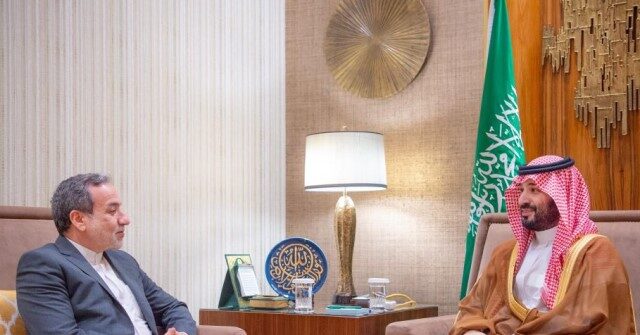In a significant diplomatic maneuver, Iranian Foreign Minister Abbas Araghchi visited Riyadh, Saudi Arabia, to engage in high-level discussions aimed at addressing Israel’s military operations against Iran’s ally, Hamas. This meeting, confirmed by the Saudi Press Agency (SPA), involved Araghchi and his Saudi counterpart, Foreign Minister Prince Faisal bin Farhan, emphasizing the importance of strengthening bilateral relations amidst the ongoing Middle Eastern conflicts. While the Saudi side portrayed the meeting as a step toward enhancing diplomatic ties, Iranian media framed the discussions as a concerted effort to halt what they term “Israel’s crimes,” highlighting Iran’s increased focus on rallying regional support against Israeli actions.
Iran’s diplomatic agenda, led by Araghchi, aims to coordinate regional responses to perceived Israeli aggression, especially in light of the violence stemming from the Hamas attacks on October 7, 2023. Officials from Iran expressed a commitment to facilitating a truce that would satisfy the militant groups they support, which includes Hamas and Hezbollah. The Iranian government is working to capitalize on the situation by directing its narrative toward galvanizing support from Muslim nations, calling attention to the humanitarian suffering in Gaza and Lebanon stemming from the ongoing violence, which it labels as “genocide.” The framing of Araghchi’s visit, as reported by the Iranian news outlet Tasnim, reveals Iran’s intent to position itself as a leader in the struggle against Israel, thereby solidifying its influence over its proxy groups.
This meeting marks an important development in the historically tense relationship between Iran and Saudi Arabia, particularly as it follows another high-profile exchange only weeks earlier. Just last week, the Iranian President Masoud Pezeshkian met with Prince Faisal in Doha, reflecting a growing trend of diplomatic interactions between the two nations. The newfound cooperation comes at a time when Saudi Arabia has experienced a notable shift in its approach toward Israel, contrasting the previous year’s momentum toward normalization, which has dissipated in the wake of escalating tensions following the Hamas attacks. Saudi Arabia’s prior engagement with Israel had been fueled by the Trump-era Abraham Accords, which facilitated normalization with other Gulf states but has since faltered under President Biden’s administration.
Biden’s diplomatic overture towards Saudi Arabia appeared to have revived ties to some extent, particularly following the damage wrought by the fallout from journalist Jamal Khashoggi’s assassination. However, recent geopolitical developments indicate that Saudi Arabia has pursued alternative alliances, notably with China, which facilitated the resumption of diplomatic relations between Iran and Saudi Arabia in early 2023. This growing partnership has ushered in a concerted effort to unify opposition against Israel, galvanizing a broader coalition that finds itself at odds with American interests in the region, particularly as violence persists between Israel and Iranian-backed groups.
The context surrounding Araghchi’s visit further underscores the transforming dynamics within the region. Despite the Iranian foreign minister’s supportive rhetoric regarding resistance against Israel, the Saudi narrative during the meeting notably prioritized bilateral relations rather than focusing predominantly on the Israeli conflict. Prince Faisal’s statements emphasized the importance of reconciling differences and advancing mutual interests as adjacent nations. Crown Prince Mohammed bin Salman has also taken a definitive stance against Israeli actions, categorizing the Palestinian situation as a top priority for the kingdom, explicitly tying the normalization of relations with Israel to the establishment of a Palestinian state, a shift from earlier positions that did not explicitly tether diplomatic ties to Palestinian issues.
Saudi Arabia’s evolving stance on normalization with Israel illustrates the complexities of Middle Eastern geopolitics, shifting from proactive engagement to stern opposition in light of emerging crises. Earlier indications of progress toward normalization, as expressed by Saudi officials, now seem jeopardized by the severity of violence that emerged from the recent conflict. The situation represents a dramatic turning point where Saudi leaders, initially optimistic about diplomatic relations with Israel, have had to reassess priorities and articulate strong condemnations of Israeli actions. The kingdom’s commitment to the Palestinian cause and the requirement for establishing an independent state as a precursor for diplomatic engagement with Israel highlights the intricate balancing act that Riyadh must navigate amidst an intricate web of regional tensions and alliances.
In conclusion, the developments following Araghchi’s visit signal a nuanced landscape of diplomacy in the Middle East, blending the complexities of bilateral relations, regional alliances, and the overarching conflicts that underline the relationships among Iran, Saudi Arabia, and Israel. As the Saudi leadership continues to consolidate its position on the Palestinian issue and reassess its relations with Israel, Iran seeks to maneuver diplomatically to bolster its influence in the region through proxies and alliances. The evolving dialogue between Iran and Saudi Arabia could foreshadow a complex interplay of relations that may redefine future interactions in the broader Middle Eastern political landscape, particularly as they continue to respond to the changing tides of conflict and diplomacy.

